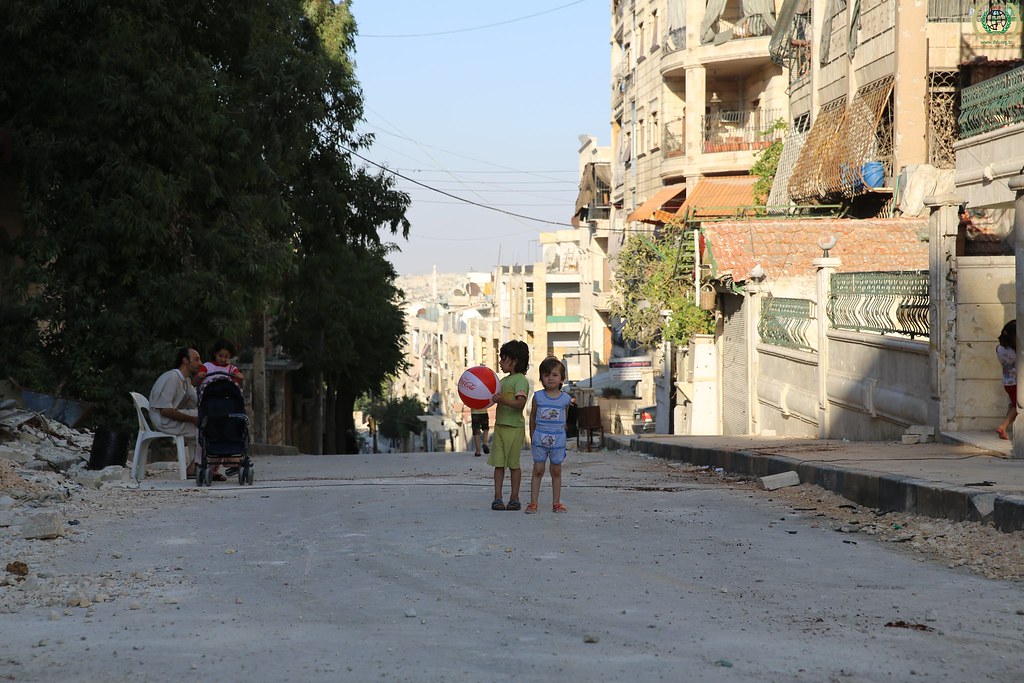Summary:
Syria’s enduring conflict escalates as Hayat Tahrir al-Sham (HTS) rebels launch a shocking offensive, capturing key areas in Aleppo and Hama. This surge has deepened the humanitarian crisis, displacing tens of thousands and triggering intensified regional and international reactions. Meanwhile, the U.S. and its allies face growing scrutiny for inconsistent foreign policies that perpetuate instability and suffering.
A Decade-Long Nightmare Renewed
Syria, a country celebrated as a cradle of ancient civilizations, now represents one of the most enduring modern tragedies. More than a decade after the Arab Spring raised hopes for democracy and reform, the nation remains locked in a devastating war. Bashar al-Assad, Syria’s president since 2000, continues to lead the country. Assad succeeded his father, Hafez al-Assad, who held power for nearly 30 years. As the leader of the Ba’ath Party, Assad’s presidency has been shaped by both internal support and significant international controversy.
In late November 2024, Hayat Tahrir al-Sham (HTS), a militant group previously linked to al-Qaeda, launched a surprise offensive, seizing significant areas in Aleppo and Idlib. This sudden attack displaced over 48,500 civilians, worsening an already dire humanitarian crisis. According to the Syrian Observatory for Human Rights, the offensive has caused massive destruction, including damage to schools, hospitals, and other essential infrastructure.
In response, Syrian and Russian forces escalated airstrikes, targeting densely populated areas like Aleppo’s university district. These retaliatory strikes have added to the humanitarian toll, with aid organizations reporting widespread devastation. Essential services, such as hospitals and clinics, have been destroyed, leaving thousands without access to critical care.
For many in the West, the Syrian conflict’s intricate web of alliances and rivalries may seem overwhelming. Yet understanding this war is essential, as it reveals how competing global powers and regional interests continue to exact devastating human costs on the people of Syria.
The Battlefield: Aleppo, Hama, and Beyond
On November 27, Hay’at Tahrir al-Sham (HTS) launched an offensive that captured key strategic areas, including Aleppo’s military academy and Tel Rifaat. According to Middle East Eye, the group utilized advanced first-person-view (FPV) drones to dismantle government defenses, marking the most significant rebel advance since 2020. This rapid collapse of defenses has left Syrian forces and their allies scrambling to reassess their positions, as reported by Reuters.
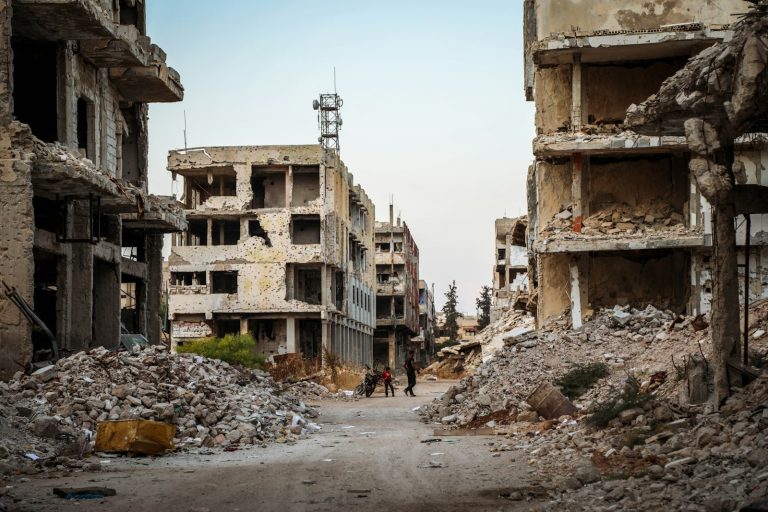
War Torn Syria, 2022, by Mahmoud Sulaiman, via Unsplash
Turkey’s role in the offensive has drawn significant scrutiny. While Turkish Foreign Minister Hakan Fidan has denied direct involvement, The Guardian suggests Turkey broadly supported the operation, driven by frustration with Syria’s leadership over its refusal to negotiate and continued attacks on Idlib, which have displaced thousands toward Turkey’s borders. Fidan has called for reconciliation between Damascus and opposition groups, proposing Turkish mediation. However, preconditions such as the withdrawal of Turkish forces have hindered progress.
In retaliation, Syrian and Russian forces intensified their airstrikes across Aleppo, Idlib, and northern Hama, targeting hospitals, schools, and other civilian infrastructure. Syrian Civil Defense rescue workers have reported rising civilian casualties. Meanwhile, in rebel-controlled Aleppo, bread and fuel shortages have worsened, illustrating the fragility of supply chains in conflict zones, according to Reuters.
The offensive has reignited tensions among regional and global powers involved in Syria. Emergency talks in Ankara between Turkey, Iran, and Russia discussed reviving the Astana process to address Syria’s political future. The Guardian notes that Turkey views the offensive as leverage to pressure Syria’s leadership into negotiations, while Iran and Russia have urged Turkey to curb its support for groups like the Syrian National Army. Analysts warn that Turkey’s backing of the HTS-led advance risks further destabilizing Syria and complicating efforts to address the growing refugee crisis.
Adding to the chaos, clashes between U.S.-backed Syrian Democratic Forces (SDF) and Syrian government troops near Deir al-Zor have opened a new front in the conflict. Reuters reports that airstrikes targeting Iranian-backed militias and shifting control over Euphrates villages have further complicated this crowded battlefield, where the U.S., Russia, Iran, and Turkey vie for influence.
Fears of mass displacement and ethnic cleansing loom large, particularly for Kurdish populations in Aleppo’s Sheikh Maqsoud district, who face mounting threats reminiscent of Turkey’s 2018 Afrin operation. According to The Guardian, critics argue that forums like the Astana process increasingly serve to normalize external military presences rather than pave a path toward peace.
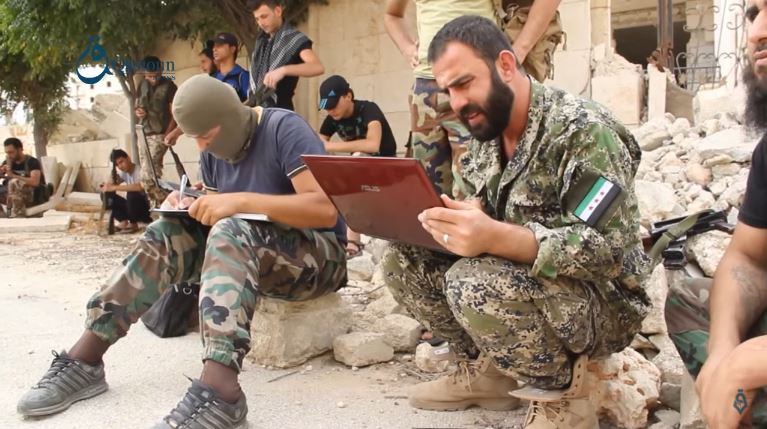
Opposition forces shell with rockets launchers YPG sites in Aleppo, Qasioun News Agency, 2015, CC BY 3.0, via Wikimedia Commons
A Proxy War: The Players and Their Interests
The renewed violence underscores the international nature of Syria’s war, where the country has become a battleground for competing global and regional powers. These proxy battles perpetuate instability and magnify the humanitarian toll, leaving civilians caught in the crossfire. Below is a breakdown of the major players and their complex roles.
- Russia and Iran
Russia and Iran continue to back Bashar al-Assad’s government, although their agendas sometimes diverge. Iran, intent on maintaining its supply routes into Lebanon and Syria, has reportedly deployed reinforcements to Aleppo, including Iranian-backed Iraqi militias, according to The Guardian. Meanwhile, Russia provides vital air support and diplomatic cover for Assad, using the conflict as an opportunity to test its military capabilities and secure a strategic foothold in the Middle East. However, Israel’s targeted airstrikes have pressured Iran’s influence by damaging assets linked to Hezbollah and Iranian forces. - Turkey
Turkey’s involvement has drawn significant controversy. While Turkish Foreign Minister Hakan Fidan denies direct involvement, Middle East Eye notes that Ankara has been accused of facilitating advanced drone technology for Hayat Tahrir al-Sham (HTS). Turkey’s broader objectives include weakening Kurdish-led groups like the Syrian Democratic Forces (SDF) and securing its influence in northern Syria. Frustrated with Assad’s refusal to negotiate and ongoing attacks on Idlib, Turkey appears to view the escalating conflict as an opportunity to apply pressure while addressing its domestic refugee crisis. - United States
The United States denies involvement in the recent escalation but continues to support the SDF, complicating the regional dynamics. According to Reuters, American forces remain in eastern Syria as part of the campaign against ISIS. The U.S.’s partnership with Kurdish factions, such as the SDF, remains a sore spot for Turkey, which views these groups as linked to the PKK, a Kurdish separatist organization it designates as a terrorist group. - Israel
Israel’s actions, while indirect, significantly impact the conflict. The Times of Israel reports ongoing airstrikes targeting Iranian and Hezbollah assets in Syria, which have weakened Assad’s allies and inadvertently benefited groups like HTS. These airstrikes, aimed at curbing Hezbollah’s influence, demonstrate the ripple effects of Israel’s military operations on the broader dynamics of the war. - Lebanon
Lebanon’s role revolves around Hezbollah, an Iranian-backed group operating across the border. As The Guardian highlights, Hezbollah uses Syria as a corridor for regional influence. Its deepening involvement underscores Lebanon’s precarious position as both a neighbor to the conflict and a battleground for proxy power struggles involving Israel and Iran. - Other Players and Rumors
Speculation about Ukrainian intelligence aiding Syrian rebels with drone technology has circulated but remains unverified. Syrian warfare analyst Cihat Arpacik, quoted by Al Jazeera, dismisses these rumors, noting that Syrian factions have spent years developing their own drone capabilities.
The competing agendas of these global and regional actors create a complex web of alliances and rivalries, making diplomatic solutions increasingly elusive. As The Guardian observes, Iran and Russia have urged Turkey to curb its support for HTS-led forces, while Ankara uses the offensive as leverage against Assad. As these powers pursue their geopolitical objectives, ordinary Syrians bear the brunt of the violence, displacement, and economic devastation. Analysts warn that without a unified strategy for peace, Syria faces further fragmentation and an even deeper humanitarian crisis.
Escalation and Humanitarian Crisis
The renewed conflict in Syria has inflicted devastating consequences on civilians, particularly Kurdish communities in Aleppo’s Sheikh Maqsoud and Ashrafieh neighborhoods. These populations now face mounting threats from Turkish-backed Syrian National Army factions and Hay’at Tahrir al-Sham (HTS).
According to Middle East Eye, over 120,000 Kurds, many already displaced from Afrin in 2018, have been forced to flee once again to temporary shelters in northeast Syria. This echoes the horrors of Turkey’s 2018 Afrin operation, which was marked by mass arrests, torture, and forced displacement. Fears of ethnic cleansing are growing as Kurdish communities brace for potential violence and displacement. International humanitarian organizations have called the crisis in Syria a genocide.
Residents in besieged areas report catastrophic living conditions. Water, electricity, and internet are nonexistent, while food shortages raise fears of starvation. As Middle East Eye reports, Syrian and Russian airstrikes on hospitals and clinics have left entire neighborhoods in Idlib and Aleppo without access to medical care. HTS has offered Kurdish fighters a deal to leave the city, but civilians remain deeply hesitant to abandon their homes and livelihoods. Kurdish representative Sinam Mohamad expressed their fears, saying, “There’s a fear of history repeating itself.”
According to the United Nations Office for the Coordination of Humanitarian Affairs (UNOCHA), more than 48,500 people have been displaced in recent weeks, enduring freezing conditions with minimal access to shelter or aid. Kurdish enclaves in Afrin and Aleppo now face existential threats, with The Guardian reporting rising concerns of ethnic cleansing as SNA and HTS forces push further into historically Kurdish areas. Human Rights Watch has documented severe abuses, including arbitrary arrests, property seizures, and sexual violence targeting Kurdish populations.
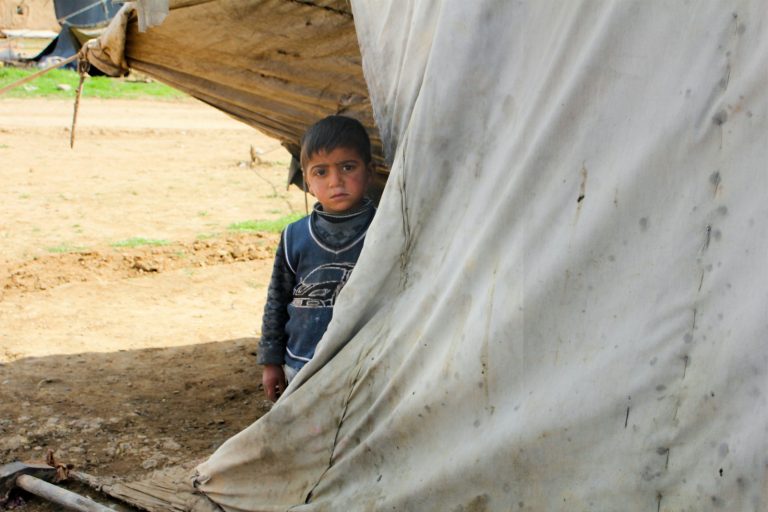
Photo by Salah Darwish, via Unsplash
These reports highlight the staggering human cost of Syria’s renewed violence, driven by geopolitical rivalries that leave civilians caught in the crossfire. As The Guardian notes, the destruction of critical infrastructure and the failure of international actors to mount a coordinated response have left vulnerable populations with little hope. Survival has become a daily battle against hunger, illness, and violence. Without immediate action, the suffering of Syria’s most vulnerable will remain a chilling reminder of the global community’s failure to prioritize humanity over politics.
Western Contradictions and Hypocrisy
The United States publicly calls for de-escalation in Syria and the protection of civilians, as reiterated by State Department Spokesperson Matthew Miller on December 2, 2024. Miller emphasized the US commitment to a Syrian-led political process under United Nations Security Council Resolution 2254, which envisions a path toward elections and a political settlement. Yet, the actions and omissions of Western powers expose troubling inconsistencies in their approach to global conflicts.
While advocating for peace in Syria, the US recently approved $725 million in military aid to Ukraine, prioritizing its geopolitical contest with Russia over urgent humanitarian crises elsewhere. Simultaneously, billions continue to flow to Israel, despite allegations of war crimes in Gaza. In contrast, the US remains silent on Turkey’s campaigns in northern Syria, which have displaced thousands of Kurdish civilians, as reported by Middle East Eye. Although the US continues to support the Kurdish-led Syrian Democratic Forces (SDF) in their fight against ISIS, its reluctance to confront Turkey, a NATO ally, underscores a selective approach to justice.
Critics argue that Washington’s inconsistency undermines its moral credibility. The American Service Members’ Protection Act, or “The Hague Invasion Act,” intensifies these contradictions. This law allows the US to use military force to protect its personnel or allies from prosecution by the International Criminal Court (ICC). While the US champions ICC actions against Russian officials for war crimes in Ukraine, it actively shields allies like Israel and Turkey from accountability, as suggested by Al Jazeera.
These double standards extend to Syria, where humanitarian efforts are paralyzed. Recent attacks on hospitals and schools in Idlib, intensified by the looting of aid convoys, have left tens of thousands in dire need. Yet, the US response remains focused on geopolitical maneuvering rather than addressing the root causes of the suffering.
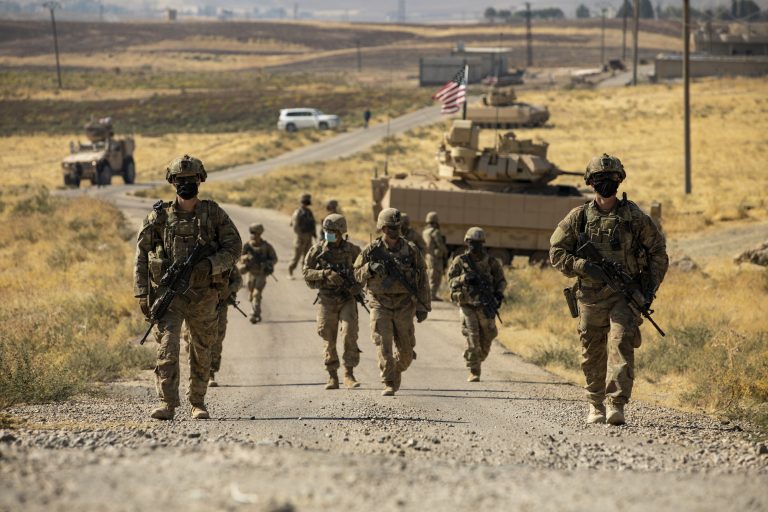
U.S. soldiers from 1st Battallion, 6th Infantry Regiment in eastern Syria, by Spc. Jensen Guillory, 2020, via Wikimedia Commons
Western audiences must grapple with a sobering question. Can nations that preach human rights and accountability genuinely lead by example when their actions so often contradict their words? Addressing these inconsistencies requires more than rhetoric. It demands a commitment to uphold the same principles universally, whether in Ukraine, Gaza, or Syria. Without such change, the cycle of violence and impunity will continue, leaving civilians to bear the brunt of these failures.
Conclusion: A Conflict That Demands Attention
Syria’s war is not just a distant tragedy, but also a stark reminder of our shared humanity and the cost of indifference. The people of Syria, fathers trying to protect their children, mothers searching for food and medicine, and children dreaming of a life free from fear, are not so different from us. Yet, as powerful nations pursue their interests, these voices are silenced, their suffering invisible to much of the world.
For many in the West, Syria may feel like a far-off conflict, but its lessons are universal. It is a story of resilience against unimaginable odds and a call to confront injustice wherever it exists. Ignoring Syria means ignoring the values we claim to uphold including peace, dignity, and the right to live free from violence.
The world cannot afford to look away any longer. Understanding Syria’s complexities is the first step toward meaningful action, action that prioritizes humanity over politics. If we do nothing, history will judge us for our apathy. If we act, we can offer hope to those who have endured unimaginable hardships and begin the long journey toward justice and peace.





